Related Research Articles

Marie Bashkirtseff was a Russian émigré artist. She lived and worked in Paris, and died at the age of 25.

Marguerite Durand was a French stage actress, journalist, and a leading suffragette. She founded her own newspaper, and ran for election. She is also known for having a pet lion. For her contributions to the women's suffrage movement in France, the Bibliothèque Marguerite Durand was named in her honor.
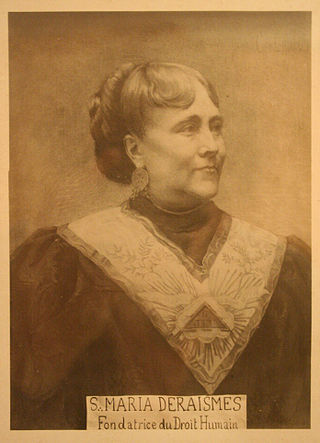
Maria Deraismes was a French author, Freemason, and major pioneering force for women's rights.

Hubertine Auclert was a leading French feminist and a campaigner for women's suffrage.

Cécile Brunschvicg, born Cécile Kahn, was a French feminist politician. From the 1920s until her death she was regarded as "the grande dame of the feminist movement" in France.

Elisabeth Dmitrieff was a Russian revolutionary and feminist activist. The illegitimate daughter of a Russian aristocrat and a German nurse, she had a comfortable upbringing but was marginalized within the Russian aristocracy due to the circumstances of her birth, leading to her interest in Marxism and the radical ideas of Nikolay Chernyshevsky. She entered into a marriage of convenience with Mikhail Tomanovski, a colonel who had retired early due to illness, in order to access her inheritance, which she used to fund revolutionary causes such as the Russian-language journal Narodnoye delo. Her money and married status allowed her to leave Russia and study in Geneva, where she participated in founding the Geneva section of the International Workingmen's Association. Sent by the Geneva section as an envoy to London, she became close to Karl Marx and his daughter Jenny.

Jeanne Deroin was a French socialist feminist. She spent the latter half of her life in exile in London, where she continued her organising activities.
Events from the year 1881 in France.

Eliska Vincent was a Utopian socialist and militant feminist in France. She argued that women had lost civil rights that existed in the Middle Ages, and these should be restored. In the late 1880s and 1890s she was one of the most influential of the Parisian feminists. She created extensive archives on the feminist movement of the 19th and early 20th centuries, but these have been lost.

Léon-Pierre Richer was a French free-thinker, freemason, journalist and feminist who worked closely with Maria Deraismes during the early years of the feminist movement in Paris. He edited Le Droit des femmes, a feminist journal that appeared from 1869 to 1891. He was founder of the Ligue française pour le droit des femmes, one of the main feminist organizations in France in the 1880s. However, Richer was concerned that women were not sufficiently educated in republican principles, and that giving them the vote could cause a clericalist and monarchist reaction and the loss of democracy.

The French Union for Women's Suffrage was a French feminist organization formed in 1909 that fought for the right of women to vote, which was eventually granted in 1945. The Union took a moderate approach, advocating staged introduction of suffrage starting with local elections, and working with male allies in the Chamber of Deputies.
Association française des femmes diplômées des universités (AFFDU) is a recognized association, which was created in 1920. This French section of the International Federation of Academic Women (IFUW), is an NGO. Moreover, AFFDU has a consultative status with the United Nations. The affiliation of AFFDU to the European Women's Group and the UWE Group, in the Council of Europe gives to it an international status. Marie-José Jonczy, a lawyer, is the current president of AFFDU and she has directed the activities of this association.
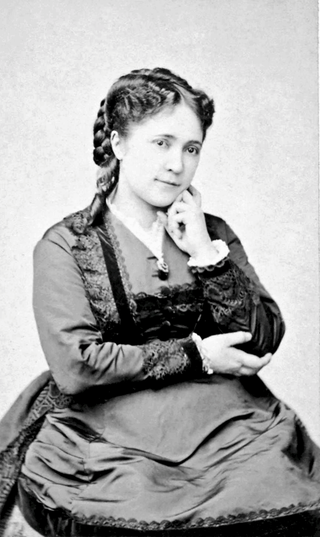
Marie-Louise Gagneur was a French feminist writer and activist. In 1901, she was awarded the Legion of Honour.
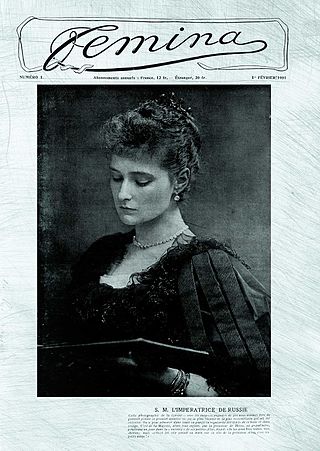
Femina was a French magazine created on February 1, 1901 by Pierre Lafitte and discontinued in 1954. The title gave its name to the Prix Femina from 1922.
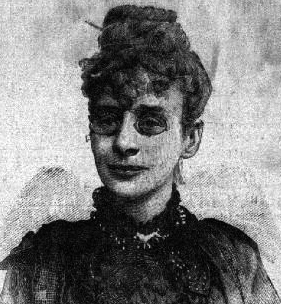
Marie-Rose Astié de Valsayre was a French violinist, feminist, nurse and writer, who is remembered for attempting to overturn legislation prohibiting women to wear trousers and for a fencing duel she had with an American woman. After studying medicine, she had provided emergency services during the Franco-Prussian War in 1870. In 1889, she created the Ligue de l'Affranchissement des femmes calling for women to be added to the electoral lists.

Léonie Rouzade, born Louise-Léonie Camusat (1839–1916) was a French feminist, politician, journalist and author. An active supporter of women's rights, in 1880 together with Eugénie Pierre, she founded the Union des femmes, the first socialist women's association in France. As a writer, in 1872 she published two novels: Le Monde renversé and Voyage de Théodose à l'île de l'Utopie.
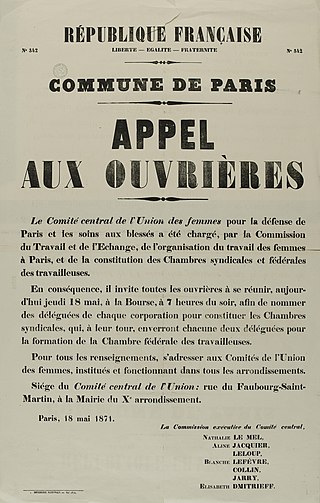
Union des femmes pour la défense de Paris et les soins aux blessés was a women's group during the 1871 Paris Commune. The union organized working women, ensured a market and fair pay for their work, and participated in the defence of Paris against the troops of the Third Republic, particularly at Place Blanche.
Stella Blandy was a French writer and a committed feminist. A contributor to the literary journals Revue contemporaine and Revue des deux mondes, she wrote novels and essays, and also translated English and Italian works into French. Blandy died in 1925.
Andrée Michel was a French sociologist, feminist, anticolonialist, and antimilitarist.

Adélaïde Valentin, also known as Colonel Valentin, was a labourer and communard. She was, during the last month of the Paris Commune, the colonel of the Federated Legion of Women.
References
- ↑ Eichner, Carolyn J. (2009-02-01). "La Citoyenne in the World: Hubertine Auclert and Feminist Imperialism". French Historical Studies. 32 (1): 63–84. doi:10.1215/00161071-2008-013. ISSN 0016-1071.
- ↑ Eichner, C. J. (2009). "La citoyenne in the World: Hubertine Auclert and Feminist Imperialism". French Historical Studies. 32 (1): 63–84. doi:10.1215/00161071-2008-013. ISSN 0016-1071.
- ↑ "MyDay - Important events - The feminist newspaper La Citoyenne is first published in Paris by the activist Hubertine Aucler". myday.si. Retrieved 2021-11-15.